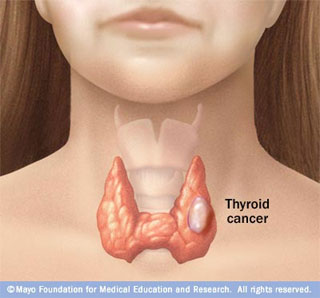Thyroid cancer overview
Any phrase with the word “cancer” in it can seem quite scary. Thyroid cancer develops when unusual cells make an appearance in one’s thyroid gland. For those who are not familiar with it, the thyroid gland is the gland in the human body responsible for monitoring how one’s body uses energy.
This type of cancer is rather uncommon, and the good news is that most patients who develop it do quite well. This kind of cancer has a high probability of being detected early, and the majority of available treatments are rather effective.
As with any kind of cancer, there is always a chance that this cancer could come back, but in general, instances of recurrence are low. In recurring cases, it can often be years before the cancer appears again.
Causes of thyroid cancer
The exact causes of thyroid cancer are unknown. However, many medical professionals suspect that it might have something to do with a change in the DNA of one’s cells. Some of these changes occur naturally as one ages. Others are inherited genetically. It is a generally accepted fact that individuals who have been exposed to large amounts of radiation have a significantly higher chance of developing the cancer.
Thyroid cancer rates after the Chernobyl accident
A large increase in the rate of thyroid cancer occurred among people who were young children and adolescents at the time of the Chernobyl accident and lived in the most contaminated areas of Belarus, the Russian Federation and Ukraine. This was due to the high levels of radioactive iodine released from the Chernobyl reactor in the early days after the accident.
 Radioactive iodine was deposited in pastures eaten by cows who then concentrated it in their milk which was subsequently consumed by children. This was further exacerbated by a general iodine deficiency in the local diet causing more of the radioactive iodine to be accumulated in the thyroid.
Radioactive iodine was deposited in pastures eaten by cows who then concentrated it in their milk which was subsequently consumed by children. This was further exacerbated by a general iodine deficiency in the local diet causing more of the radioactive iodine to be accumulated in the thyroid.
Since radioactive iodine is short lived, if people had stopped giving locally supplied contaminated milk to children for a few months following the accident, it is likely that most of the increase in radiation-induced thyroid cancer would not have resulted.
In Belarus, the Russian Federation and Ukraine nearly 5 000 cases of thyroid cancer have now been diagnosed to date among children who were aged up to 18 years at the time of the accident. While a large number of these cancers resulted from radiation following the accident, intense medical monitoring for thyroid disease among the affected population has also resulted in the detection of thyroid cancers at a sub-clinical level, and so contributed to the overall increase in thyroid cancer numbers.
Fortunately, even in children with advanced tumours, treatment has been highly effective and the general prognosis for young patients is good. However, they will need to take drugs for the rest of their lives to replace the loss of thyroid function. (World Health Organisation. Health effects of the Chernobyl accident: an overview)
How is thyroid cancer diagnosed?
If you have a lump in your neck that could be thyroid cancer, your doctor will arrange a biopsy of your thyroid gland to check for cancer cells. A biopsy is a simple procedure in which a small piece of the thyroid tissue is removed, usually with a needle, and then checked by a pathologist.
Sometimes the results of a biopsy are not clear. In this case, you may need surgery to remove all or part of your thyroid gland before you find out if you have thyroid cancer.
Symptoms of thyroid cancer
There are several symptoms that are commonly experienced with this type of cancer, including:
- Swelling or the appearance of lumps in the neck
- Pain in the neck and sometimes the ears
- Difficulty swallowing
- Making a constant wheezing noise when breathing or having difficulty breathing regularly
- A hoarse voice
- A frequent cough that is not related to having a cold
There will be a small percentage of patients who exhibit no symptoms of the cancer at all. An existing lump will most likely be found during a routine examination by your doctor. If it is suspected that you have developed thyroid cancer, then your doctor will perform a biopsy of the thyroid lump. If the presence of cancer is confirmed, then the cancer will be need to be treated.
How is thyroid cancer treated?
Thyroid cancer is treated with surgery and often with radioactive iodine. It rarely needs radiation therapy or chemotherapy. What treatment you need depends on your age, the type of thyroid cancer you have, and the stage of your disease. Stage refers to how severe the disease is and how far, if at all, the cancer has spread.
Your doctor may also remove lymph nodes in your neck to see if cancer has spread beyond the thyroid.
The course of treatment that is decided upon will depend upon a person’s age, the severity of their cancer, and the type of cancer that they have. Once again, this type of cancer is usually highly treatable, so if a patient does develop it, their chances of good outcome will usually be high.
If you have questions or concerns about thyroid problems see your local doctor who will arrange for you to see a thyroid surgeon.

